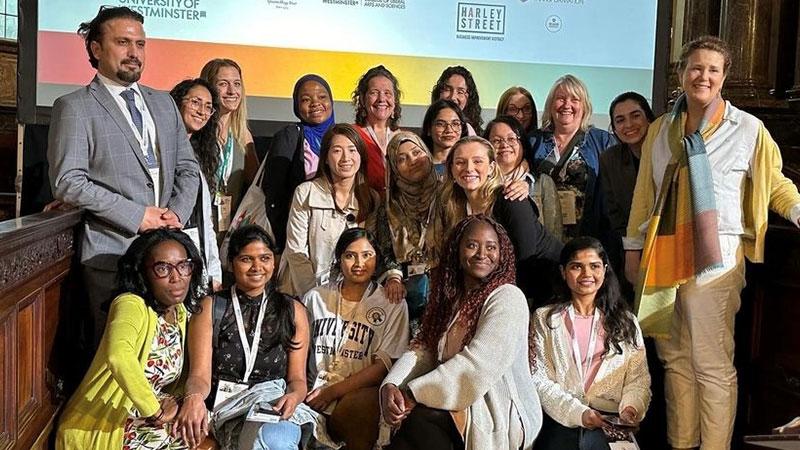One year before the end of the UN Decade of Action on Nutrition, Westminster has held the World Public Health Nutrition Congress 2024 in collaboration with the World Public Health Nutrition Association.

The four-day congress provided a forum to discuss local, national and global nutrition and health issues and explore new research on potential solutions to the hunger crisis. Over 600 delegates from 66 countries attended, including experts from the fields of nutrition, health, human rights, agriculture, trade, climate change and governance. The participants included community leaders, members from civil society organisations and NGOs, as well as government ministers, public sector bodies, academics and researchers.
The congress marked one year before the end of the UN Decade of Action on Nutrition – a commitment by UN member states to implement policies, programmes and investment over ten years to eliminate malnutrition across the globe. With this period coming to a close, the congress aimed to ensure that nutrition targets become political priorities and that marginalised groups are given a voice to find solutions.
During the congress that took place between 10-13 June, an array of experts and activists spoke about the work they have done to strive to meet nutrition targets. They challenged corporate actors in planning and policy making and exposed the lack of voice and influence from populations most affected by increasing food insecurity. Dedicated sessions explored the lived experiences of youth, low-income families, refugees, infant feeding families, the homeless, men living with addiction, senior citizens, faith-based community supporters, tertiary students and foodbanks users.

Speakers included Dr Francesco Branco, Director of Nutrition at the World Health Organisation, Chris van Tulleken, author of the best-selling book Ultra-Processed People; Professor Carlos A. Montiero, Professor of Nutrition and Public Health at the University of Sao Paulo, Brazil; Naomi Duncan, CEO of the charity Chefs in Schools, and Dr Hamid Shinwari, a refugee from Afghanistan.
Also speaking was Ian Byrne, MP for West Derby in Liverpool, who sits on cross party APPG groups to promote the Right To Food in Parliament and campaigns for London and other cities to follow Belfast and Liverpool by becoming Right to Food Cities. He highlighted that political courage is needed to make the UK a right to food and health country for all.
Ex-Mayor from Peacehaven in East Sussex Claud Cheta was also in attendance and stated that communities need to trust service providers highlighting how community kitchens can be safe warm spaces for food and friendship.
In his talk, Professor Montiero, who coined the term ultra-processed food in 2009, highlighted what needs to be done to prevent the rise of the consumption of this type of food. He said: “What people don’t realise, and what we need to raise awareness of, is the fact that many ultra-processed foods meet the criteria for addiction that have been established for tobacco products. Both are pathogenic by design. [...] The first and perhaps most crucial step is the need to provide consumers with accurate information. We have been transparent about the link between tobacco and disease, and this should be done again with ultra-processed foods. We should add specific labels for ultra-processed substances on foods and increase taxes on ultra-processed products – as has been done in several Latin American countries.”
Attendees also had the chance to watch a variety of interviews of hardworking communities and officials from across the UK and Ireland filmed by Global Public Health Nutrition MSc students as part of the Community Conversations project.
Numerous graduates of the Global Public Health Nutrition MSc course were also in attendance to make an impact on the global stage, including Ayanna Deane who became Project Officer and Public Health Nutritionist at the charity School Food Matters after completing her course.

Ayanna Deane
Dr Regina Murphy-Keith, Course-Leader of the Global Public Health Nutrition MSc course and organiser of the event, reflected on the key takeaways from the congress. She said: “The congress agreed on a number of points including health and food should not be used as weapons of war; community voices need to be sought out and listened to, especially the voice of youth and marginalised groups; we need to act with political courage to bring changes that are needed; we have power if we work together; we need to reduce negative forces in health and nutrition like industry voices promoting unhealthy ultra-processed products; resources need to be invested in strengthening intersectoral actions focusing on stronger health systems and more just food systems; we need inclusive health services free at point of access; nutritious free school meals for all children even when school is closed; and a fair wage with affordable housing and jobs. We must listen, engage and trust.”
This event directly contributes to the United Nations Sustainable Development Goals (SDG) 2: Zero Hunger, 3: Good Health and Wellbeing and 10: Reduced Inequalities. Since 2019, the University of Westminster has used the SDGs holistically to frame strategic decisions to help students and colleagues fulfil their potential and contribute to a more sustainable, equitable and healthier society.
Find out more about studying Nutrition and Public Health at the University of Westminster.









